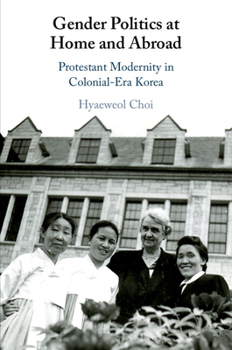Gender Politics at Home and Abroad: Protestant Modernity in Colonial-Era Korea
Select Format
Select Condition 
Book Overview
Hyaeweol Choi examines the formation of modern gender relations in Korea from a transnational perspective. Diverging from a conventional understanding of 'secularization' as a defining feature of modernity, Choi argues that Protestant Christianity, introduced to Korea in the late nineteenth century, was crucial in shaping modern gender ideology, reforming domestic practices and claiming new space for women in the public sphere. In Korea, Japanese...
Format:Paperback
Language:English
ISBN:1108720285
ISBN13:9781108720281
Release Date:October 2022
Publisher:Cambridge University Press
Length:251 Pages
Weight:0.75 lbs.
Dimensions:0.5" x 6.0" x 9.0"
Customer Reviews
0 rating





